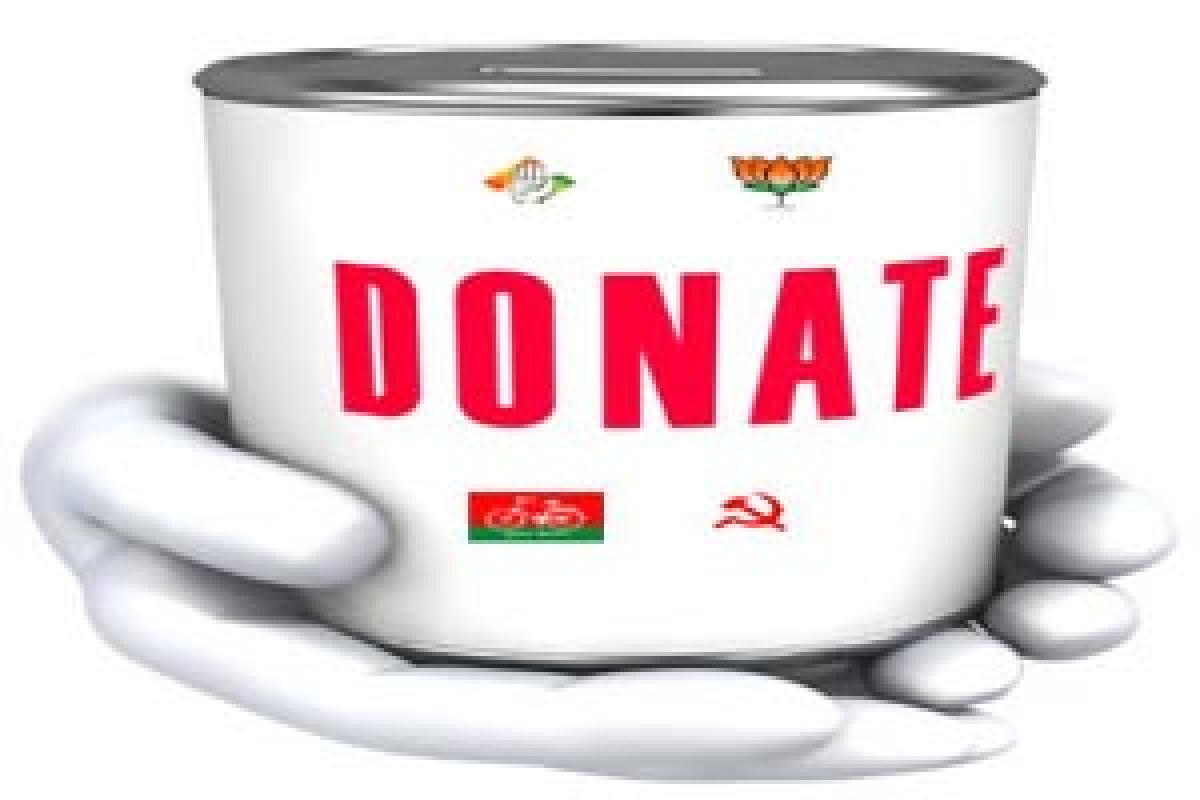Live
- Prakasam police rescues kidnapped toddler within hours
- Time to get rid of Sattavad and Parivarvad politics
- Extend neither spl nor ill treatment
- Must-Watch OTT Originals in 2024: The Year’s Best Shows and Movies
- 40 Indian startups secure over $787 mn in a week
- India now formidable force on chess board
- Raghavendra Mutt pontiff visits Tirumala
- Whistleblower of OpenAI found dead in US apartment
- Trump’s US-first policy & India’s strategic latitude
- Chandrababu pays tribute to Potti Sriramulu and Sardar Vallabhbhai Patel
Just In
Political parties will get around curbs on cash donations


If Union Finance Minister Arun Jaitley thinks that his move to reduce individual contribution to political parties from Rs 20,000 to Rs 2,000 would check influx of corrupt money into the political system, he may find himself pursuing a chimera.
If Union Finance Minister Arun Jaitley thinks that his move to reduce individual contribution to political parties from Rs 20,000 to Rs 2,000 would check influx of corrupt money into the political system, he may find himself pursuing a chimera.
Long before such provision came into existence, political parties have devised mechanism to bypass any scrutiny of their account by creating list of fictitious donations. For instance in Uttar Pradesh, regional parties are believed to have developed a skill in creating a fictitious list of contributors.
Insiders admit that most of these parties which have collected ill-gotten money through various commercial deals have created an army of people who create the list of their contributors in lakhs to turn their black money into white. Since political parties have any army of cadre, they can create this list to show as donors in large numbers.
There are several instances of Mayawati claiming to build properties and creating wealth with the help of contribution from her countless supporters. And it would be next to impossible to check the antecedents and financial condition of each contributor. Similarly in West Bengal, Tamil Nadu and Bihar, there are examples of regional parties claiming huge collections from their supporters.
There is little doubt that with Rs 2,000 limitation, the capacity to raise money would be reduced ten times. But it can be compensated by increasing the list of supporters by ten times. It is a simple mathematical calculation which may not be difficult for political ingenuity to overcome.
However, the decision to make it mandatory for parties to file I-T return and allow scrutiny of their account may act as deterrent for parties initially. In Jaitley's speech, he made it clear that the non-compliance of the process would rob political parties of their exemption from the Income Tax. Obviously the regular scrutiny of the account would entail a lot of ground work to cover up ill-gotten wealth by political leaders.
The scheme of allowing the RBI to issue bonds for political funding is quite innovative and would ensure secrecy of the donors. Those who want to contribute to political parties above board can opt for these bonds that can be cashed by registered parties. Apparently these scheme sounds too good for those who believe in transparent political conduct. Given a history of opaque behaviour of parties and their contributors, it seems quite unlikely that the scheme would get the traction it truly deserves.
The Association for Democratic Reforms (ADR) on Thursday said the union budget failed to address the issues of transparency, disclosure and penalties of political parties. It also claimed the proposals on political funding reforms fell short of the recommendations by the Election Commission and the Law Commission.
"While this is the first union budget to raise the issue of transparency in political funding, it is unfortunate to note that complete transparency in the finances of political parties has still not been adopted in the budget of 2017-18 and the proposed reforms are inconsequential as the political funding will continue to remain opaque," ADR said.
"Unless scrutiny of accounts of political parties is taken up by a body approved by Comptroller and Auditor General or the Election Commission, the parties' declared income is unlikely to reflect their true income," the ADR said, pointing to the budget not promising scrutiny of income declared by political parties from various sources.
"The budget does not propose that the details of all donors who donate above Rs 2,000 be made available to the Income Tax department and/or an external body auditing the accounts of political parties," it said. "Unless complete information is available for audit scrutiny, the sources of donations below Rs 20,000 to political parties will continue to stay hidden," it contended.
The ADR also said the ruling Bharatiya Janata Party (BJP) topped the chart in defaulting in submitting its audit reports to the poll panel. Between 2010-11 and 2014-15, BJP defaulted in the submission of its audit report with the Election Commission by an average of 182 days while the Congress defaulted by 166 days on average.
By Ajay Singh

© 2024 Hyderabad Media House Limited/The Hans India. All rights reserved. Powered by hocalwire.com






